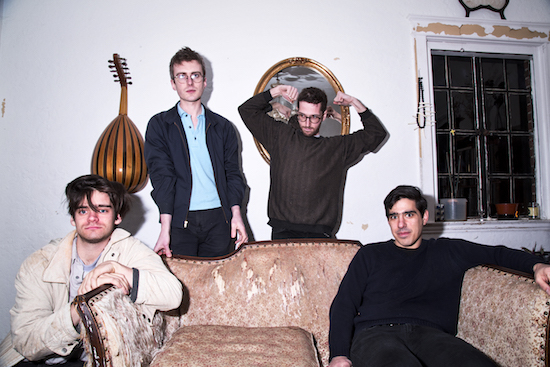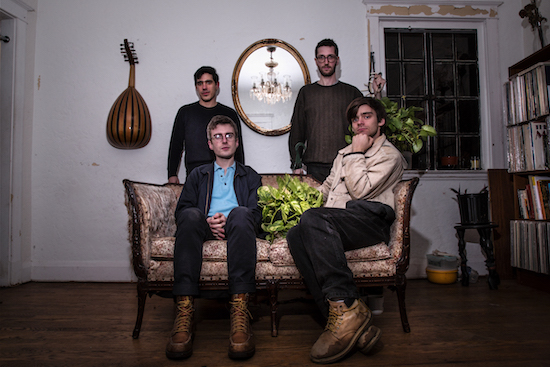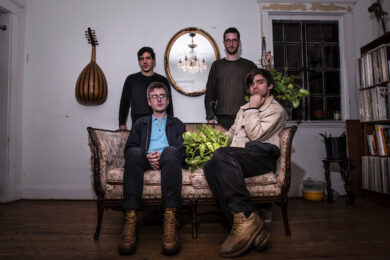Perhaps it’s a mistake to inform you that Horse Lords are doing something legitimately innovative and exciting with guitar music. Perhaps you have been burned before by such promises, finding instead a sound that’s timid and essentially orthodox. Perhaps ‘innovation’ as a musical value to its own end rouses suspicion: are there not thrills still to be squeezed from established forms? Perhaps the term ‘guitar music’, and the way in which it prioritises one instrument, is the problem.
Horse Lords, a four-piece band from Baltimore, would agree with that last hypothetical, I suspect. Their releases to date – three studio albums, the most recent being 2016’s Interventions, and scattered singles and cassettes – are hypnotic, fluid and vocal-free: rhythms and tones achieving trancelike effect through repetition and discipline. Of the guitar, bass, electronics, drums – sometimes using two kits when playing live – and saxophone, nothing elbows itself to the forefront (in terms of either the composition or the mix), and there’s the feeling of a common goal.
Rock instrumentation as socialism, maybe? Well, Horse Lords prefer to maintain a distance from commonly understood ideas of ‘rock’ too, and time spent with their brilliant music validates this. You might hear the influence of early electronic minimalism in there (just intonation tuning, which featured a lot in that movement, is also central to Horse Lords’ sound), or modern house and techno; near-century-old American string band recordings or jittery West African highlife; previous vital figures in the canon of anti-rock rock from Captain Beefheart to Can to This Heat to Sun City Girls. I’d like to think fans of acts such as Shellac, Battles and Lungfish – despite their comparative ‘rock’ structures – would get a lot from Horse Lords, too.
After an appearance later this month at Tennessee festival Big Ears, whose lineup is a consistently impressive showcase for the various tentacles of modern avant-garde music, the quartet visit Europe, finishing on Fri 21 April at the similarly delicious Safe As Milk. I spoke to all four members about those dates and many other matters.
You’ve spoken before about the band being more influenced by electronic music than rock, which is audible in Interventions especially. What kind of stuff are we talking here, though? Music that gets played in clubs (and is mastered with soundsystems in mind)?
Max Eilbacher (bass/electronics): When we are in the van, rock music is rarely played over the stereo. Most of us are into more avant-garde/far-out electronic music. I would say the electronic music I enjoy is more concerned with systems or conceptual ideas than making people dance. That’s where I feel certain works we have made have taken more influence from the Sonic Arts Union group than rock & roll music. We all have our past experiences of playing in punk, grind, rock or noise bands and without a doubt those experiences shape how we craft the music of Horse Lords, but it is not a form of music we actively mine in creating a Horse Lords tune.
The solo stuffby you guys that I’m aware of is more on the ambient/abstract end of things, I guess – have you attempted to make ‘actual’ dance music? Is there likely to be remixes of Interventions material, following on from the ‘Hidden Cities’ ones?
Andrew Bernstein (saxophone/percussion): I don’t think any of us have made much straight up dance music. We have accidentally been billed as ‘House Lords’ a few times, and we are always joking about making a House Lords record of polyrhythmic just intonation dance music. No remixes of Interventions are planned, and at this point it might be a little late, but you never know.
If it’s fair to say you have a foot in both ‘rock’ and ‘minimalism’, in terms of your setup, are there any examples of ‘rock as minimalism’ that you find especially striking or inspiring? People sometimes talk about AC/DC or the Ramones in those terms, to name two.
Owen Gardner (guitar): It is certainly fair to say that, though I think the instrumentation over-emphasises the influences of the former and under-emphasises the influences of other popular musics (funk, disco, house) – but it is a thing. My issue with the bands you mentioned (and I can’t say I’m familiar with AC/DC beyond their hits) is that they’re trapped in the song form, refusing transcendence. This is why I find so many punk bands so depressing. Three chords is two too many! Bo Diddley got it right right away.
Maybe less in terms of influence than simply permission, Neu! was an important early example of how certain rock moves might be projected into eternity. One could argue that we do with (pitch) space (in that just intonation can be used to extend the power chord) what Klaus Dinger does with time, if that makes any sense. Before I heard Neu! (or proper minimalism for that matter), I got an inkling from the verse of The Modern Lovers’ ‘She Cracked’ – just one repeated power chord, voiced powerlessly, which I stole for my high school band. I showed my stepmom what I was working on and she said, "you should probably change chords at some point," but I decided pushing ahead with the one chord was a better solution.
How did you come to want to create that trance-like / hypnotic feeling that pervades a lot of Horse Lords’ music?
AB: I think the drive to create music that can achieve trance-like states comes a lot from minimalism, and, like minimalist music, probably owes a partial debt to certain formative experiences with psychotropic drugs.
How much of what we hear on a Horse Lords album is you playing live, and how much is it edited after the fact?
Sam Haberman (drums): On our first two records [Horse Lords, 2012; Hidden Cities, 2014] the songs are played live in the studio. Interventions was our first attempt to multitrack everything while still trying to achieve a live and natural feel, which was pretty hard! But I think the lessons we learned will help us with future albums.
The artwork on your three albums to date has a commonality – patterns and repetition and order and the feel of optical illusions even if they’re not. As such it fits the music very well, but how much thought goes into getting just the right artwork for each release? Like, if the Interventions and Hidden Cities art was swapped, would it feel less ‘correct’ to you?
OG: Hermonie Williams’ art [which features on the covers of Horse Lords’ first two albums] would be as suitable for Interventions as the quilt on that album’s cover would be on any other release.
Are the band in general influenced by any specific visual artists or art movements?
OG: I would say we at least see resonances with our work in people like James Turrell and Robert Irwin. We went to the Turrell retrospective at Los Angeles County Museum Of Art a few years ago and it definitely got some gears turning. More directly inspiring is the repetitive vernacular art of quilts, rugs, plaids etc. After a show recently an audience member told me the music reminded her of weaving and I have never felt better understood. Recommended reading/looking: The Pieced Quilt: An American Design Tradition and Women’s Work: The First 20,000 Years.
All four of you feature across the last two Matmos albums – did they seek you guys out for this purpose or did you already have some Baltimore-based social relationship? Are you Matmos fans in general?
SH: We’ve been friends with Martin and Drew for years, and our collaborations with them have always been very organic; they have a way of drawing the people around them into their music. We were all big fans before they moved to Baltimore, and they’ve since been a constant source of inspiration, help and encouragement. Fun fact: Horse Lords actually started in their basement and then practiced there for a year or two, so I’m not totally sure we would exist if not for them.
What’s the precise purpose of the three mixtapes you’ve issued so far?
AB: I’m not sure if there is one – they’ve done a lot of things for us at different times. They began as a way to develop material in a more low-stakes way than a proper album, taking inspiration from hip-hop mixtapes. For Mixtape Vol. 1, we recorded a bunch of material ourselves, spliced it into a collage with field recordings, live recordings and short electronic pieces, released it ourselves and brought it on tour, all in the span of a month or two. It was a way to have a more playful approach to recording and releasing our music, independent of an official ‘Record Release’.
They have also have acted as a sounding board for new ideas – a lot of material has eventually made it on to our albums in more developed form. I feel like over time the distance between the mixtapes and the albums has narrowed, though there is still definitely a different intention behind each effort.

Are you going to do more in the series?
AB: We just finished Mixtape IV, which includes an arrangement of Julius Eastman’s ‘Stay On It’ and collaborations with Baltimore artists Abdu Ali, Bonnie Jones and Will Schorre. We’ve gotten much better at recording ourselves (Owen does a lot of heavy lifting there) and I think this instalment is the most focused in the series.
The influence of (West) African music is mentioned quite often by people writing about Horse Lords, although less so by the band themselves. I guess for me ‘Truthers’ is the obvious song that displays it, maybe ‘Macaw’ also. Is that style of guitar playing something you’ve studied?
OG: I regret not mentioning it more as the debt is deep and in certain ways under-acknowledged. I haven’t studied any African music formally, by which I mean with a native teacher, but I read as much as I can find about the musics I’m interested in and immerse myself in recordings and live performances as much as possible. I’m always trying to learn more and, while I wouldn’t be so arrogant as to say I understand any of it, I want to feel like I’ve internalized some element of what I’m studying at the time, so I can be reasonably sure what emerges is a synthesis and not just a copy.
All that said, the guitar is influenced as much if not moreso by rural American guitar and banjo styles, though they of course do have roots in Africa. The African influence is more significant on a structural level, in terms of how the parts intersect and how patterns are packed with information that can then be revealed through repetition. The influence isn’t limited to West Africa either; traditional Aka and Banda music from Central Africa and especially Wagogo music from Tanzania are crucial.
There’s a certain stigma about styles like highlife, and the way they sometimes influence Western guitar-based music in what might be seen as watered-down form. Is this something that weighs on your mind when you’re composing/recording? Is there a surefire way one can avoid this pitfall? Have Horse Lords actually copped any criticism for employing non-Western styles?
OG: It is awkward to talk about, being such a complex subject and so loaded and I’m often surprised at how little criticism we receive. The issue of appropriation does weigh on me and I don’t know if I believe that there’s a way to avoid it but I try to be vigilant, respectful and open to criticism. Another thing is just to take the material seriously and make an honest, if futile, effort to understand it.
Vampire Weekend are a really good (i.e. embarrassing) example of what to avoid: pinching superficial aspects of the music, using them as decoration and then showcasing the ‘influence’ with song titles like ‘Cape Cod Kwassa Kwassa’. Punch them! Arrogating representation of African music to yourselves as non-Africans is maybe the worst you can do. By strenuously avoiding any pretense to representation and striving to really engage the music as such and not just as a signifier, I hope we’ve bypassed what’s most offensive and uninteresting about white musicians’ engagement with African music, not to mention the music of the African diaspora.
You’re playing the Big Ears festival in the States and Safe As Milk in the UK in forthcoming weeks. Do you enjoy these kind of set-ups as a musician and/or music fan – do you think it’s a good way to consume music? Is there anyone on the lineups you’re super keen to see?
AB: I enjoy some things, some less so. There is always something else going down the street that you’re missing, so it makes it harder to sit still and enjoy a performance. People are always coming and going. On the other hand, it is an amazing opportunity to see so many artists in one place, and I do find some enjoyment in just wandering around and taking in The Festival as a whole sort of meta-performance. Any format that has allowed me to see Tashi and Yoshi Wada play with Julia Holter in a medieval Dutch cathedral [at Le Guess Who? last year] has done something right – it was awe-inspiring.
Between Big Ears and Safe As Milk, I’m excited to see Meredith Monk, Sir Richard Bishop, Nief-Norf play Michael Pisaro, This Is Not This Heat and The Residents. I would have loved to hear Matana Roberts at Big Ears, but we won’t arrive in time to see her play. Both Max and my wife Katie are part of Matmos’ rendition of Robert Ashley’s Perfect Lives at Big Ears, so I can’t miss that.
Interventions closes with field recordings from Baltimore protests following the death of Michael Brown. Whose idea was this?
SH: I made those recordings and had wanted to use them for a while, and actually the death of Freddie Gray and the subsequent uprising happened [in Baltimore] while we were recording Interventions, so it felt more urgent than ever to inject them into our music.
Is the track on some level a reaction to the sentiment that musicians/artists have a responsibility to use their platform to make statements – with, obviously, Horse Lords being an instrumental band?
SH: I don’t think it’s a reaction to the imperative to use one’s artistic platform to make a statement as much as it is that our political beliefs are deeply ingrained in the DNA of our practice as musicians. It’s all of a piece really; it just shows on the surface in some ways more than others.
Conversely, has there been a political aspect to previous Horse Lords releases that maybe isn’t obvious due to their wordless nature?
SH: While on one level it is trickier to communicate political ideas as an instrumental band, it’s also possible to inject them in a way that is perhaps more direct and that foregrounds other voices instead of our own. Field recordings of protests are especially good for this, which is why we’ve used them a few times: the Quebec student protests in 2012, the Michael Brown protests, and on our upcoming tape we used recordings from the recent Women’s March.
What do you have planned next, release-wise?
AB: Mixtape IV will be released at the beginning of May on Northern Spy, and we will have some pre-release copies on tour with us the next couple of months.
Check tQ for a Horse Lords exclusive tomorrow. They play Quietus-partnered festivals Big Ears in Knoxville Tennessee (information here) and Safe As Milk in Prestatyn (information here)



